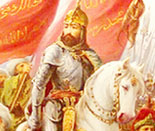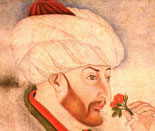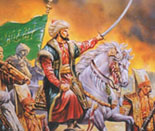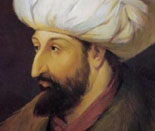 |
 |
| |
|
| |
FATIH SULTAN MEHMET. CONQUEROR OF ISTANBUL (CONSTANTINOPLE)

|
| |
Fatih Sultan Mehmet (1432-1482), also known as
Mehmed II or The Conqueror, ruled the Ottoman Empire for a brief
time, from 1444 to 1446, after his father, Sultan Murad II renounced
the throne, and again after his father died, from 1451 to 1481.
Within two years of reclaiming the throne in 1451 he overthrew the
Byzantine Empire by conquering Constantinople, thereby consolidating
the Ottoman Empire and marking the end of the Middle Ages. During
the siege of Constantinople, Fatih Sultan Mehmet’s men numbered over
100,000 (including slaves conscripted from conquered states), and
approximately 125 ships were at his disposal. The Ottomans used
gunpowder to great effect during the siege, and the Sultan embraced
new technological developments that tipped the scales in his favor,
including “Orban’s cannon,” a piece of artillery over 25 feet long
that could fire cannonballs up to a mile, that he had commissioned
from a European craftsman named Orban.
After the fall of Constantinople in May 1453, Fatih Sultan Mehmet
turned his attention to conquering Turkish and Greek states in
Anatolia and the Balkans, reaching Belgrade by 1456. His attempts to
take Belgrade failed, although his Empire continued to rule most of
Serbia. His ultimate goal was to conquer Rome, solidifying
Constantinople’s role as the “New Rome,” and to this end he invaded
Italy in 1480; he met with resistance and died before he was able to
see his dream realized. |
 |
|
| |
|
|
| |
 |
|
| |
|
|
| |
Fatih Sultan Mehmet’s reign was known for its tolerance of religious
differences and intellectual vigor; the Sultan himself spoke seven
languages and was responsible for the construction of eight
universities. He was an avid art collector; developed a particular
interested in the Renaissance; forged cultural ties with the West,
and maintained a personal library filled with texts on medicine,
geography, philosophy, and ancient history. Under his rule, the
Ottoman Empire’s civil and criminal laws were codified into a single
body of law. The Sultan is widely regarded as a gifted linguist and
is credited with introducing the word “politics” into the Arabic
language. He was succeeded by his son, Byazid II.
After the Sultan’s death, the Ottoman Empire remained culturally
strong, surviving Serbian uprising, Macedonian civil war, and
economic stagnation, until it began its slow decline in the 1800s.
The Ottoman Empire survived until the First World War, when the
Allies partitioned the Empire after the Treaty of Versailles. |
 |
|
| |
|
|
| |
 |
|
| |
|
|
| |
|
|
| |
|
|
<-Back |
|
|
 |
|
